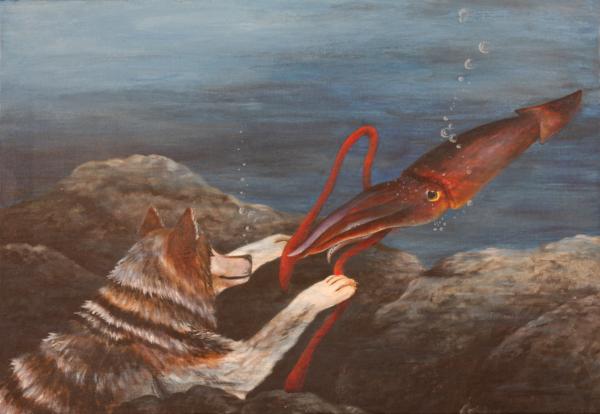_Ticks that transmit Lyme disease are spreading northward into Sweden and Canada, once too cold for them.Do they always use underscores as bullets? Anyway, it's nice to see my study organism make the top five, er, six. But in my opinion, when people ask about the squid range expansion--"Is it global warming?"--the only scientifically rigorous answer is "Maybe."
_Giant Humboldt squid have reached waters as far north as British Columbia,
threatening fisheries along much of the western North American coast.
Clear-cut cases of range expansions and invasions due to rising temperatures certainly exist. But with our currently limited knowledge, the Humboldt squid isn't among them. The range expansion is itself a documented definite, but we're still trying to figure out the cause(s). By "trying," I mean my colleages are gathering and crunching data every day--catching squid, downloading information from satellites, and running statistical analyses. It's an active, exciting research area precisely because we don't have the answer yet.
At this weekend's meeting of the Western Society of Naturalists, a great many excellent talks addressed climate change impacts, from the individual organism to the ecosystem. But there was also an awareness of the need not to turn climate change into a scapegoat for all ecological disasters. One speaker in particular cautioned that we must be certain that the impacts we ascribe to climate change aren't caused by some other disruptive factor--of which there are many. Amid a frenzy of climate-change activism, one mustn't yield to the temptation to cry wolf!
Speaking of wolves, one of humanity's most pervasive impacts on the planet is the reduction or complete elimination of large animals, particularly predators. The gray wolf once ranged throughout North America. Now, as the result of widespread extermination efforts, it's almost completely gone from Mexico and the continental US.
Setting aside aesthetic appreciation, why should anyone care? Here's one reason:
Wolves eat deer. In the absence of wolves, deer populations explode. With the sudden abundance of deer, ticks have a field day. With the proliferation of ticks comes an outbreak of Lyme disease.
Is it really that simple? Probably not. And climate change could have a big effect, too. But it's not necessarily the whole story.
Similarly, the Humboldt squid invasion (see, I am bringing it back to squid!) could be influenced by both direct (overfishing of squid predators) and indirect (climate change) ecosystem changes.
So, maybe the lesson is to cry "wolf!" and "fire!" at the same time?

Or maybe I just wanted an excuse to post this awesome painting by Michelle Miron:





Comments